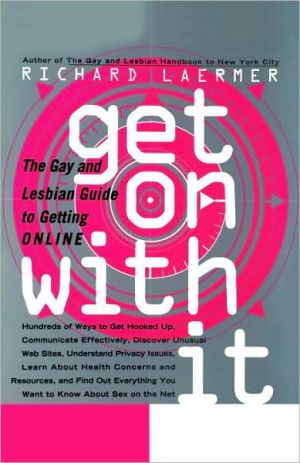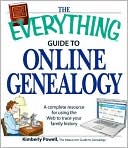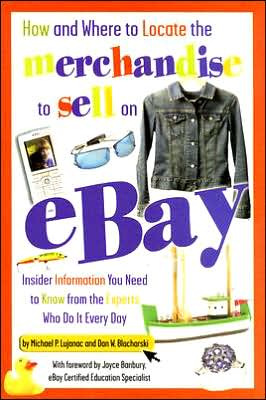Get on with It: The Gay and Lesbian Guide to Getting Online
From an overview of how the Internet works--including a primer on computer communication and explanations of how providers like America Online, CompuServe, Microsoft Network, and the many lesser-known companies operate--to a savvy insider's evaluation of the services available to gay men and lesbians online, Richard Laermer presents a definitive survey of what's happening in queer cyberspace today and how to make the most of it. \ Get On With It describes how to meet people with common...
Search in google:
From an overview of how the Internet works—including a primer on computer communication and explanations of how providers like America Online, CompuServe, Microsoft Network, and the many lesser-known companies operate—to a savvy insider's evaluation of the services available to gay men and lesbians online, Richard Laermer presents a definitive survey of what's happening in queer cyberspace today and how to make the most of it. Get On With It describes how to meet people with common interests, find information on health and other personal issues, keep up with the latest news, learn about travel or drag, and simply do more online. More than 350 World Wide Web sites and other internet access areas are discussed and rated candidly. Learn how to use E-mail uniquely, join newsgroups en masse, get into chat areas, surf the Net for outrageous and unpredictable sites, and where to go "off-line." Such controversial matters as pornography, privacy, and censorship are also investigated in detail. Library Journal Laermer has moved from writing books for gay and lesbian travelers (The Gay & Lesbian Handbook to New York City, Dutton, 1994) to authoring a virtual travel guide to the Internet, written in a hip, conversational style that uses graphic language. Laermer covers ways to connect to the Internet, including online services like America Online and cybercafs as well as ISPs. He also goes into detail about lesbian- and gay-related Usenet groups and Internet Relay Chat. More than a how-to-use-the-Internet guide, this book helps the socially as well as technologically shy with directions on how to flirt online and how to meet and mingle, and it even includes a chapter devoted to guiding readers to gay porn. While running the risk of being already out of date, Gay & Lesbian On-line (LJ 1/97), the only other book on this subject, might be more suitable and useful for libraries already worried about the Internet and sex. Libraries not facing such problems will find this guide informative and up-to-date.Jerilyn Veldof, Univ. of Arizona Lib., Tucson
No more television for you.\ It's not that you've been bad. You just don't need it anymore. Thanks to the Internet, and an invention called the World Wide Web (WWW), nobody has to worry whether or not the cable is working. The point is now connectivity. Are you on, that is, are you online? To paraphrase Bill Gates, how fast do you want to go?\ That is the point of this book: to get you up, on, and out -- so you will find yourself learning more, communicating more, meeting more, and of course, just becoming more of a part of this grand citizenry we call the gay and lesbian community.\ The Web may be a great place to hang out. But you have to know how to use it. I spent eleven months, or nearly the lifetime of the Web, meandering through the corridors of an electronic medium I now call home. I discussed the pros and cons of Web watching with dozens of Webmasters (the creators), a few hundred "addicted" users, and some Internet types so technically inept that they made people like you and me look like technology innovators.\ I started this project as the least technical guy you might meet. I was enticed by the idea that if I could conquer this thing called the Web, then anyone had a shot. I discovered that the Internet is a lot bigger than most people think it is: It allowed me to learn more than anyone told me it would. I met friends, waved to enemies, even got my passport renewed by downloading software.\ The net is just a spiderweb of computers. That's all. The software that takes you into cyberspace consists of browsers that let you find what you're looking for. But the software isn't the net. The computers on the net are not organized in any specific way. One is simply attached to another and that to several others, and where they are located in cyberspace is defined by the address. Information travels much as it does by word of mouth: two friends tell two friends who...and so on.\ Meanwhile, technology is not what this is about. Imagination is. If you get a good Web browser and locate that one Web site or chat area you admire and love, you can go there and remain pretty happy for a while. Or, if you wish, you can go there and be pretty down -- there are sites (listed in Chapter 7) for getting you down too.\ Every person you meet online and every link you make by clicking on a brightly lit word (a hot link or hypertext) will take you to the next level. Each layer you unveil as you head up the learning curve of the Internet makes it more fascinating and, sometimes, a little frustrating. But stick with it. Don't let it overwhelm you. Imagine that it's just another step in the evolution of the phone: from tin cans to huge servers. People often ask how to start, or where to go after they've plateaued. Learn as much as you can from the thousands of offerings on the net, bookmark those sites that turn you on, make sure your software is strong enough to handle your desires -- and suddenly you're surfin' safari, baby.\ Privacy, Talk and the Dirty Secrets of the Internet Relay Chat Rooms\ The gates to the universe of Internet Relay Chat (IRC) channel are open, and in this world anything goes. In the IRC, cyberqueers can interact with other gays and lesbians all over the globe and live out their sexual fantasies, discuss current politics, exchange tips on gardening or carpentry, or join up in a private chat room with men or women wanting to participate in group activities.\ Why is the IRC so cool for gays and lesbians?\ The IRC attracts so many gays and lesbians all over the world, and especially in the United States, because most IRC chat channels are not monitored by any official governmental agencies, nongovernmental organizations that promote so-called moral values, or private institutions. Those IRC channels that are run through online services, may, however, be monitored or even recorded. You will have to check with your specific online service to get more details.\ IRC has its own culture. The limited control by outside individuals and institutions contributes to the diversity of communications on the IRC. Gay and lesbian communications have often sought to pervade the culture by rendering its methods invisible to the participants of the "real world", i.e. nongay. The IRC is an invaluable tool in the sophisticated methods of communication used by many gays and lesbians. Anonymity on the IRC draws the loonies, crazies, and the eternally repressed out to play, along with the curious, the playful, and the quite creative -- a mixture of people that makes for a delightful and adventurous experience.\ Earlier in the book I told you about the Gay Murder Case, a strange killing in New Jersey that led police authorities to AOL's headquarters in Vienna, Virginia, to perform the first search of America Online records, on January 28, 1996. After sifting through electronic information and e-mail all day, officers confiscated dozens of files and turned them over to authorities in New Jersey.\ Although civil and criminal court subpoenas have been served on online services, in recent years the search warrant has demonstrated law enforcement's ability to reach information that some computer users incorrectly thought was confidential. That is, of course, the reason that IRC works for most gays and lesbians. No one can interfere. It just isn't possible!
AcknowledgmentsIntroduction: A Primer for Everyone on (and about) the Web11Dot.Com.Whatever: Questions and Answers from Web World72Usenet - Or Lose It243E-mail: Where It's @304Commercially Serviceable485AOL: The Big Gimmick836Privacy, Talk, and the Dirty Secrets of the Internet Relay Chat Rooms997The World of the Modern Computer Geek: A Host of Sites1148Porn Again1759Lesbian Light20610Health22211Get Off the Internet ... Okay? (A Selection of Tourist Cybercafes)24612Paper (The Media)266Glossary273Gay Words293Index299
\ Library JournalLaermer has moved from writing books for gay and lesbian travelers (The Gay & Lesbian Handbook to New York City, Dutton, 1994) to authoring a virtual travel guide to the Internet, written in a hip, conversational style that uses graphic language. Laermer covers ways to connect to the Internet, including online services like America Online and cybercafs as well as ISPs. He also goes into detail about lesbian- and gay-related Usenet groups and Internet Relay Chat. More than a how-to-use-the-Internet guide, this book helps the socially as well as technologically shy with directions on how to flirt online and how to meet and mingle, and it even includes a chapter devoted to guiding readers to gay porn. While running the risk of being already out of date, Gay & Lesbian On-line (LJ 1/97), the only other book on this subject, might be more suitable and useful for libraries already worried about the Internet and sex. Libraries not facing such problems will find this guide informative and up-to-date.Jerilyn Veldof, Univ. of Arizona Lib., Tucson\ \








